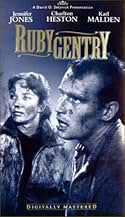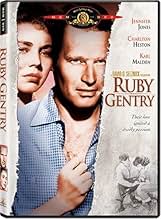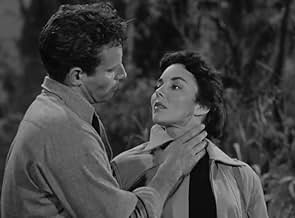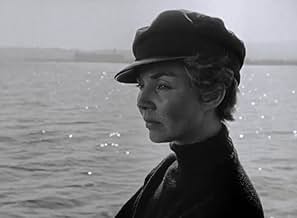VALUTAZIONE IMDb
6,6/10
1882
LA TUA VALUTAZIONE
Aggiungi una trama nella tua linguaA sexy but poor young girl marries a rich man she doesn't love, but carries a torch for another man.A sexy but poor young girl marries a rich man she doesn't love, but carries a torch for another man.A sexy but poor young girl marries a rich man she doesn't love, but carries a torch for another man.
- Regia
- Sceneggiatura
- Star
Barney Phillips
- Dr. Saul Manfred
- (as Bernard Phillips)
- …
Peter Adams
- Joage--Golfer
- (non citato nei titoli originali)
Edgar Dearing
- Engineer
- (non citato nei titoli originali)
George Fields
- Harmonica Player
- (non citato nei titoli originali)
Thomas Browne Henry
- Cotton Warehouse Owner
- (non citato nei titoli originali)
Selmer Jackson
- Club Member at Bar
- (non citato nei titoli originali)
Recensioni in evidenza
Charlton Heston is at the height of his hunk stage and played an unusual type, against his rugged, frontier persona. Jennifer Jones is sultry and moody through several decades, backed by the haunting "Ruby" theme. Richard Hyman's harmonica is a perfect compliment to the two lead character types. I think it is even more effective in black and white than it could ever have been in color. Perhaps this element underscores the black and white social mores of the era. This movie is the first to really make me believe Jennifer Jones character is principally an emotionally grounded person, touchable by others. I usually find her too self contained to feel deeply. I have seen this movie several times, and thoroughly appreciate it each time.
A drama set in a small town in North Carolina that doggedly holds on to the strict social division between the classes, all the more so given the fact that powerful post war 20th century economic forces are changing everyone's fortunes, and now the old money (what's left of it) can only grasp onto the past in order to maintain their weakened grip on their obsolete social hierarchy. To threaten the social order more is saucy Jennifer Jones, who all the upper class guys lust after, a woman from the wrong side of the tracks with a born again brother (James Anderson) who throughout the film reminds her that her soul is doomed to eternal damnation as she tempts and pleases Charlton Heston, who's upper class family has only their good name left, and who is promised to only moderately attractive and far less sexy Tracy McCauliff (Phyllis Avery) who's family is still rich AND respected. It's quite a trade off. The best scene comes after Heston and Avery marry and are at the local country club for a dance, and Heston and Jones dance provocatively while Jone's husband, the rich and jealous Karl Malden, who she decided to marry after she lost out on Heston,can't believe that this is happening to him. The film falters somewhat as it lurches towards the end, but pacing wise and photographically (B&W by the great Russel Harlan) it's definitely worth checking out.
I saw this when I was very young and it was quite risqué for 1952. Jennifer was beautiful and very seductive. The thought of a woman being shown on the screen engaged in seduction was far from the norm for my family. I went with my friend and was afraid to tell my Mother. I need to rent this and see if it still holds up after all this time. I'm sure Jennifer will as she was a wonderful actress. I love Charlton Heston because is a journeyman actor but he bugs me. He always seems to be the same person. Karl Malden is an actors actor and never gives a bad performance. The setting was typical of that time, poor girl seduces rich boy. The other one was rich girl falls for poor boy. Sure never happened in my life. What I remember most though was the music as It is so plaintive.. I have it downloaded and it is one of my favorites.
It's no big surprise that RUBY GENTRY receives such mixed reviews, because the theme of the film will not appeal to small-town America. Ruby is a girl from the wrong side of the tracks, as the narrator at the beginning of the film states. What this is code for in classic Hollywood is not necessarily straight translation. In other words, we are in the realm of a lost art form: the romantic film, or the melodrama. King Vidor was a master of this craft.
Ruby, then, was different. She was a free spirit, an unconventional thinker, and a seductive beauty. This is a lethal combination in the small, conservative town Ruby grows up in. She falls in love, of course, with the 'popular' boy, the rich kid, who the most well-bred society girls are after. Of course none of them have anything except their money against Ruby, and Boake (Charlton Heston) knows it! So there is an essential conflict between what Boake wants (Ruby) and what he is expected to have. He, unlike Ruby, is rather weak, and afraid. Deep down he loves her, but he lacks her spirit and wisdom. He won't go after someone looked down on by the town. He has to be 'respectable.' He cares what others think. Ruby does not, so she is willing to fight for him, but at the same time she does not want to be taken for granted. She wants her love to be fulfilled through marriage; he only wants her as a sex object.
I think it is important to note that Ruby Gentry is not necessarily a femme fatale, nor does she necessarily sin. She simply follows her heart. However, a series of accidents, including the death of her wealthy husband, occur, and Ruby is involved in scandal after scandal. The people always choose to believe the worst of her because she represents what they despise: an independent woman with beauty and natural intelligence, and class mobility.
RUBY GENTRY is a masterpiece. King vidor, my favorite director, is at the top of his form. Jennifer Jones, a talented and underrated actress, makes Ruby both sympathetic and believable. Charlton Heston is extremely effective as a complex character--one who on the surface seems shallow, but beneath the surface you can still feel his love for Ruby (which he struggles to hide, or deny).
Boake and his family feel they are above Ruby. Even Ruby's brother is judgmental and calls her a 'sinner,' based on assumptions. The final event in the film is a tragedy, but noteworthy because it was not the fault of Ruby or Boake, but a judgmental, hypocritical, and merciless society, imposing religious and social institutions which hinder us all.
The film is not dated. If anything, it proves melodrama is more effective than realism sometimes, where larger-than-life human emotions are concerned. People who call a movie like RUBY GENTRY 'trash' are actually in denial that the theme, and the emotions, are as vividly real and relevant now as ever. Anyone who thinks social class, sex appeal, and money do not count for everything in today's world, just as then, hasn't a clue. These are timeless themes, and the relationships in the film, and how they were negatively affected by the prejudice and snobbery around them, can be compared to any number of contemporary homosexual or interracial relationships, among others. How's that for relevance?
Sometimes the bigger emotions, the tragedies, are more appropriately told in melodramatic terms--because they are serious and heartbreaking and should not be reduced to cinematic language that conveys anything less!
Ruby, then, was different. She was a free spirit, an unconventional thinker, and a seductive beauty. This is a lethal combination in the small, conservative town Ruby grows up in. She falls in love, of course, with the 'popular' boy, the rich kid, who the most well-bred society girls are after. Of course none of them have anything except their money against Ruby, and Boake (Charlton Heston) knows it! So there is an essential conflict between what Boake wants (Ruby) and what he is expected to have. He, unlike Ruby, is rather weak, and afraid. Deep down he loves her, but he lacks her spirit and wisdom. He won't go after someone looked down on by the town. He has to be 'respectable.' He cares what others think. Ruby does not, so she is willing to fight for him, but at the same time she does not want to be taken for granted. She wants her love to be fulfilled through marriage; he only wants her as a sex object.
I think it is important to note that Ruby Gentry is not necessarily a femme fatale, nor does she necessarily sin. She simply follows her heart. However, a series of accidents, including the death of her wealthy husband, occur, and Ruby is involved in scandal after scandal. The people always choose to believe the worst of her because she represents what they despise: an independent woman with beauty and natural intelligence, and class mobility.
RUBY GENTRY is a masterpiece. King vidor, my favorite director, is at the top of his form. Jennifer Jones, a talented and underrated actress, makes Ruby both sympathetic and believable. Charlton Heston is extremely effective as a complex character--one who on the surface seems shallow, but beneath the surface you can still feel his love for Ruby (which he struggles to hide, or deny).
Boake and his family feel they are above Ruby. Even Ruby's brother is judgmental and calls her a 'sinner,' based on assumptions. The final event in the film is a tragedy, but noteworthy because it was not the fault of Ruby or Boake, but a judgmental, hypocritical, and merciless society, imposing religious and social institutions which hinder us all.
The film is not dated. If anything, it proves melodrama is more effective than realism sometimes, where larger-than-life human emotions are concerned. People who call a movie like RUBY GENTRY 'trash' are actually in denial that the theme, and the emotions, are as vividly real and relevant now as ever. Anyone who thinks social class, sex appeal, and money do not count for everything in today's world, just as then, hasn't a clue. These are timeless themes, and the relationships in the film, and how they were negatively affected by the prejudice and snobbery around them, can be compared to any number of contemporary homosexual or interracial relationships, among others. How's that for relevance?
Sometimes the bigger emotions, the tragedies, are more appropriately told in melodramatic terms--because they are serious and heartbreaking and should not be reduced to cinematic language that conveys anything less!
In Braddock, North Caroline, the free-spirited and poor Ruby Corey (Jennifer Jones) is a sexy woman in love with Boake Tackman (Charlton Heston), who belongs to a former wealthy family that lost their land that is flooded. Ruby has lived during high-school with the wealthy businessman Jim Gentry (Karl Malden) and his wife Letitia Gentry (Josephine Hutchinson) that had unsuccessfully tried to teach etiquette to Ruby. Later she returned to the house of her father Jud Corey (Tom Tully) and her pious brother Jewel Corey (James Anderson) in the swamps. When Boake decides to marry the rich Tracy McAuliffe (Phyllis Avery), Ruby is courted by Dr. Saul Manfred (Bernard Phillips) but accepts to marry Jim that has recently widowed.
The population of Braddock does not accept the marriage of Ruby and Jim. Then, Ruby dances with Boake in a club and Jim has a fistfight with Boake and calls Ruby a tramp. On the next morning, Jim apologizes with Ruby and they go sailing. However there is an accident and Jim drowns in the sea. Ruby is accused by the population of murdering Jim and she decides to revenge, using the money she inherited from Jim and foreclosing on the debts of the hometowns. But Ruby is still in love with Boake and her behavior will lead them to a tragedy.
"Ruby Gentry" is a melodramatic romance directed by King Vidor, the master of this genre. The melodrama is excessive, with a wild young woman in love with a popular young man in a conservative town. Her revenge against those that blame her is great but the conclusion is silly. Rubby working as a skipper of a fishing boat does not make sense for a woman with her strong personality (and money). My vote is six.
Title (Brazil): "A Fúria do Desejo" ("The Fury of the Desire")
The population of Braddock does not accept the marriage of Ruby and Jim. Then, Ruby dances with Boake in a club and Jim has a fistfight with Boake and calls Ruby a tramp. On the next morning, Jim apologizes with Ruby and they go sailing. However there is an accident and Jim drowns in the sea. Ruby is accused by the population of murdering Jim and she decides to revenge, using the money she inherited from Jim and foreclosing on the debts of the hometowns. But Ruby is still in love with Boake and her behavior will lead them to a tragedy.
"Ruby Gentry" is a melodramatic romance directed by King Vidor, the master of this genre. The melodrama is excessive, with a wild young woman in love with a popular young man in a conservative town. Her revenge against those that blame her is great but the conclusion is silly. Rubby working as a skipper of a fishing boat does not make sense for a woman with her strong personality (and money). My vote is six.
Title (Brazil): "A Fúria do Desejo" ("The Fury of the Desire")
Lo sapevi?
- QuizAccording to Charlton Heston, Jennifer Jones broke two bones in her hand hitting him in a fight scene. As a result, Jones had to wear several bracelets covering up a cast.
- BlooperThe swamp background noise instead of being NC wildlife is jungle noises - Perhaps the same sound clip from Cape Fear with Gregory Peck. Both were to have taken place in the swamps of NC - yet both sounded like something out of Tarzan.
- Citazioni
Ruby Gentry: Turn off the pumps.
- ConnessioniEdited into Histoire(s) du cinéma: Une histoire seule (1989)
I più visti
Accedi per valutare e creare un elenco di titoli salvati per ottenere consigli personalizzati
Dettagli
Botteghino
- Budget
- 525.000 USD (previsto)
- Tempo di esecuzione1 ora 22 minuti
- Colore
- Proporzioni
- 1.33 : 1
Contribuisci a questa pagina
Suggerisci una modifica o aggiungi i contenuti mancanti




































